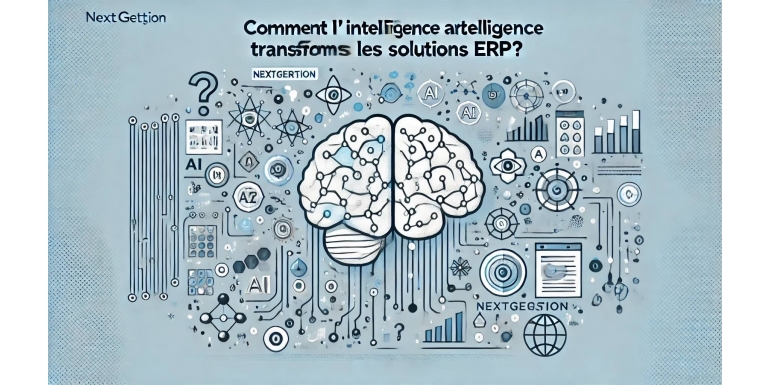
How Artificial Intelligence is Transforming ERP Solutions
Artificial intelligence (AI) is revolutionizing many aspects of business management, and ERP (Enterprise Resource Planning) solutions are no exception. By integrating AI technologies into ERP systems, companies can significantly improve their operational efficiency, decision-making, and ability to anticipate market changes. This article explores in detail how artificial intelligence is transforming ERP solutions and the benefits it brings to businesses of all sizes.
What is Artificial Intelligence in the Context of ERP?
Artificial intelligence in ERP refers to the integration of advanced technologies such as machine learning, natural language processing (NLP), predictive analytics, and robotic process automation (RPA). These technologies enable ERP systems to analyze vast amounts of data, learn from past behaviors, predict future trends, and automate complex tasks that previously required human intervention.
Examples of AI in ERP Solutions
-
Predictive Analytics: AI enables ERP solutions to predict future trends by analyzing historical data. For example, businesses can forecast product demand, anticipate stock shortages, or even identify customers likely to disengage.
-
Process Automation: AI allows ERP systems to automate many repetitive tasks, such as data entry, order management, or invoicing. This frees up employees to focus on higher-value activities.
-
Supply Chain Optimization: Artificial intelligence can analyze supply chain data in real-time to optimize logistics processes, reduce costs, and minimize delays.
-
Enhanced Customer Support: ERP systems with AI can use natural language processing to provide automated customer support via chatbots, capable of resolving common issues or redirecting complex queries to human agents.
Benefits of Integrating AI into ERP
1. Improved Decision-Making
One of AI's main strengths is its ability to provide insights based on accurate, up-to-date data. In ERP solutions, AI can analyze massive volumes of data in real-time to generate reports and forecasts that help decision-makers make informed choices.
-
Speed and Accuracy: Unlike traditional decision-making methods, which can be slow and prone to human error, AI offers rapid and accurate analyses based on sophisticated algorithms.
-
Anomaly Detection: AI can identify anomalies or deviations from normal trends, allowing businesses to respond quickly to potential problems before they become critical.
2. Intelligent Automation
AI's ability to automate complex processes is a major asset for modern ERPs. This goes beyond simply automating repetitive tasks; AI can make autonomous decisions in critical processes, such as optimizing inventory levels or managing cash flow.
-
Reduced Operational Costs: Process automation through AI reduces the need for human intervention, thereby lowering operational costs.
-
Increased Productivity: Smart ERP systems allow employees to focus on strategic tasks, thereby improving overall business productivity.
3. Personalization and User Experience
Artificial intelligence allows ERP systems to adapt to the specific needs of each user. Through machine learning, systems can anticipate user actions, customize interfaces, and provide tailored recommendations.
-
Intuitive Interfaces: AI-powered ERP systems can learn from user habits to offer a smoother and more intuitive experience.
-
Personalized Recommendations: Based on historical data and past behaviors, AI can suggest actions or strategies tailored to each user, improving operational efficiency.
4. Enhanced Data Management
One of the major challenges businesses face today is managing the vast amounts of data generated daily. AI integrated into ERPs can not only manage this data efficiently but also extract valuable insights from it.
-
Real-Time Data Analysis: AI-powered ERP systems can process data in real-time, enabling instant decision-making.
-
Data Quality Management: AI can automate data cleaning and validation, ensuring that the information used by the business is always accurate and up-to-date.
Challenges of Integrating AI into ERP
While the benefits of AI in ERP solutions are numerous, its integration also presents challenges that must be overcome.
1. Implementation Complexity
Integrating AI into an existing ERP system can be complex and requires advanced technical skills. Businesses must ensure they have the necessary resources to manage this complexity.
-
Implementation Cost: The initial costs of integrating AI can be high, especially for companies that also need to upgrade their IT infrastructure.
-
Need for Specialized Skills: Implementing AI requires expertise in data science, analytics, and software development, which not all companies possess internally.
2. Change Management
Introducing AI into ERP processes can lead to significant changes in how employees work. Change management is therefore essential to ensure a smooth transition.
-
Resistance to Change: Employees may resist adopting new technologies, especially if they drastically change their daily tasks.
-
Training and Support: Providing adequate training and ongoing support is essential to help employees adapt to using AI in ERP systems.
Conclusion: The Future of ERP with AI
Artificial intelligence is radically transforming ERP solutions, providing businesses with powerful tools to improve efficiency, reduce costs, and make more informed decisions. However, to fully benefit from AI, companies must be willing to invest in technology, develop the necessary skills, and manage organizational changes.
AI in ERP is not just about improving existing processes; it opens up new possibilities for innovation, personalization, and intelligent automation. As these technologies continue to evolve, it is essential for businesses to stay ahead of the curve to maintain their competitive advantage in the market.
